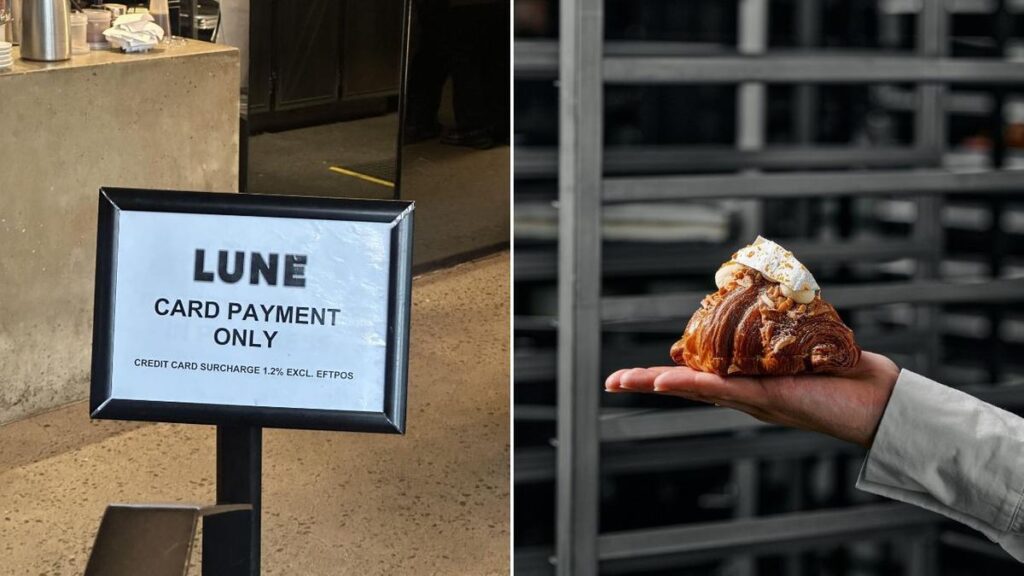
A surcharge policy at Lune Croissanterie, a beloved Australian cafe chain, has sparked a heated debate among customers, with some calling for a boycott. The controversy began when a customer posted a photo on Reddit showing a sign at a Lune location that stated the cafe only accepts card payments and applies a 1.2 percent surcharge to credit card transactions, excluding EFTPOS.
The post quickly gained traction, with the original poster accusing the bakery of illegal practices. However, other Reddit users were quick to clarify that the surcharge only applies to credit card users and those using tap-and-go payments, not to EFTPOS transactions. Despite these clarifications, some customers expressed frustration over the need to manually select EFTPOS to avoid the surcharge, arguing it was an unfair practice.
One Reddit user commented, “Cash is king, boycott them. I refuse to shop anywhere that won’t accept cash.” Another added, “Some venues I’ve been to you don’t see what they’re really charging on the initial screen then suddenly after payment it pops up with a $1 something surcharge.” Such sentiments reflect a broader discontent with card surcharges in Australia.
Understanding the Legal Landscape
The controversy highlights a common practice among Australian businesses, which is legally permissible under the Australian Competition and Consumer Commission (ACCC) guidelines. According to the ACCC, businesses can impose surcharges on card payments, but these must not exceed the cost incurred by the business to process the payment type. This means that if a consumer has no surcharge-free payment option, the surcharge should be included in the displayed price of an item.
The ACCC’s guidelines specify that a business’s average cost of acceptance for Visa debit is 1 percent and 1.5 percent for Visa credit. Therefore, businesses are expected to charge surcharges that align with these costs, ensuring transparency and fairness in transactions.
Comparisons and Industry Standards
Lune’s surcharge policy is not unique. Other retailers, such as Aldi, also apply surcharges to credit card and contactless payments. The Reserve Bank of Australia’s 2023-24 data indicates that card payment processing costs for medium-sized businesses range from 0.25 percent to 1 percent for debit or EFTPOS transactions and 0.75 percent to 1.5 percent for credit transactions.
Medium business, processing from $1 million to $100 million in card transactions a year: Debit or EFTPOS 0.25% to 1%, Credit: 0.75% to 1.5%.
These figures provide a benchmark for businesses to set their surcharges, ensuring they reflect actual processing costs rather than serving as an additional revenue stream.
Consumer Reactions and Implications
The backlash against Lune’s surcharge policy underscores a broader consumer frustration with card payment practices. Many customers feel that the lack of a cash option limits their payment choices, leading to calls for boycotts and a push for businesses to reconsider their payment policies.
As digital payments become increasingly prevalent, businesses face the challenge of balancing operational costs with customer satisfaction. While surcharges are a legitimate way to cover transaction fees, transparency and clear communication with customers are crucial to maintaining trust and avoiding backlash.
Lune Croissanterie has not yet responded to requests for comment on the controversy. However, the discussion it has sparked may prompt other businesses to reevaluate their approach to card surcharges and consider how they communicate these policies to customers.
Looking Ahead
As the debate over card surcharges continues, both consumers and businesses will need to navigate the evolving landscape of digital payments. For consumers, understanding the legal framework and their rights regarding surcharges is essential. Meanwhile, businesses must ensure compliance with ACCC guidelines while striving to offer payment options that meet customer expectations.
The situation at Lune Croissanterie serves as a reminder of the complexities involved in modern payment systems and the importance of transparency in fostering positive customer relationships. As the industry evolves, ongoing dialogue between consumers, businesses, and regulatory bodies will be key to ensuring fair and equitable payment practices.






